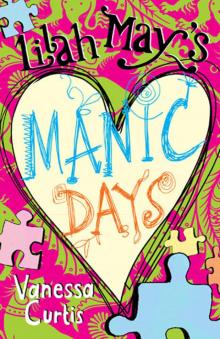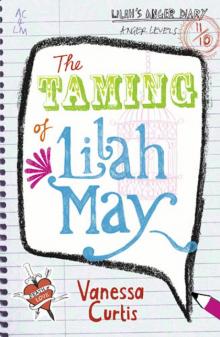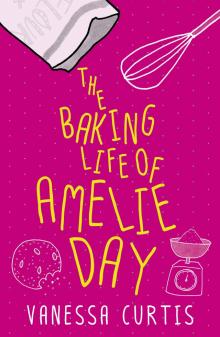- Home
- Vanessa Curtis
The Earth Is Singing Page 15
The Earth Is Singing Read online
Page 15
Over our lunch we talk about what has happened.
“I hear that they might have been taken to a new work camp at Salaspils,” says Mrs Petersohn. “At least they may get some food if they work.”
“Hmm,” says Mama. “Or maybe they were taken further east.”
“Did you notice though?” says Mrs Petersohn. “Many of the people in the columns were those who were sick and elderly, or very young. How could they work?”
We are silent for a moment. Of course I had noticed that but I don’t want to worry Mama any more than she is already worried.
We all know that if you are unable to work, the SS cast you aside like mouldy carrot tops.
“Perhaps we will be marched like that soon,” says Mrs Petersohn. “To join the others in the camp. We should try to train up for it. Stay strong. We do not want to be the weak or sick ones on the journey.”
There is a general consensus that we should indeed try to build ourselves up a bit for any forthcoming march which might be heading our way.
So for the next couple of days we make a point of walking up and down the stairs and round the rooms, trying to build up the dead muscles in our wasted thighs and calves.
I put my leg up on the window sill and begin to do my dance stretches and warm-ups again, even though I am too weak to do any actual dancing. A lot of the time I am starting to do my dancing in my imagination instead. In my head I am still strong and supple and have hard muscles in my calves. In reality the skin is starting to sag and hang around the backs of my legs.
Max watches me in silence.
His dark eyes start to make me feel strange, but I do not stop. A part of me likes him watching as I bend over my stretched-out leg, showing the arch of my spine and the curve of my buttocks.
At night I have started to think about Max.
It softens the pain of missing Uldis and the anger at what he did to us.
Max is more of a boy than Uldis was but his face is grown-up and serious and I like the way his dark hair flops over one eye and how he looks out for his little sister and passes her the best bits of food. We all do that. It is painful to see a four-year-old child wasting away from hunger.
Mama ventures out to the ghetto store every day and comes back with plentiful amounts of mouldy vegetables but as we are so hungry we wolf them down without complaint.
On the third day of December she comes back inside with a new urgency in her eyes.
“They still need women seamstresses,” she pants, throwing down a pile of potatoes and beets so that they tumble off the box and onto the floor. “To work in the city. They will be fed, allowed to stay in the ghetto and not resettled elsewhere!”
She looks at me with her eyes full of hope and confusion.
Then we turn to look at Max and Sascha.
The two of them stand there in silence.
Chapter Seventeen
Love is all about choices.
How do you choose between what is best for one person and what is right for another?
This is the dilemma that Mama has on the evening of 3rd December.
If I had not been involved in the equation too, her choice would have been simple.
“I will go and be resettled in the new work camp,” she would have said. “I may find Omama there.” But it is not simple. Mama has me to consider too and she is worried about leaving Max and Sascha on their own.
We spend the next half an hour discussing the matter.
“If we take the work as seamstresses here it will only be for a while and we may get food,” says Mama. She looks at the stale lump of bread that I am about to eat. It is about the size of a postage stamp. “Then we will be stronger when the time comes for us to go to another camp. On the other hand if we go to the camp sooner, we have more chance of finding Omama.”
“What if there is no other camp, anyway?” I say. “We may end up somewhere worse.”
Mama looks at me. I can actually see her weighing up the options with a scowl, like the Jewish storekeeper in our ghetto store who weighs up our tiny amounts of rationed sugar on his balancing scales and frowns as he tips it into a tiny bag.
There is no sugar left anywhere now.
“What do you think?” I ask Max. He is home all day with us too at the moment. None of us dare go near the ghetto gates or fence for fear of being shot. Because we are not being called to work at the moment we have very little food left and Mama has only a few pennies of her saved-up money.
Max shrugs. I guess it’s not so important to him what happens to my family. He is only concerned with looking after Sascha and finding Janis. There are some holes in the fence to the Small Ghetto but it is under armed guard and too dangerous to risk going through, even though some men from the Small Ghetto have risked it at night-time and come back to our part of the ghetto to see if they can reclaim any of their lost belongings.
In the end it is Max who makes the decision.
“You two go and register as seamstresses,” he says to me and Mama. “If you can get work in the city then you can come back here every evening with food for the rest of us.”
Mama still looks doubtful but she can see the sense in what he is saying about the food for everybody else.
“Well,” she says. “Do up your coat, Hanna. I guess we’d better go and register for work.”
By the time Mama and I emerge into the cold and walk to Mazā Kalna iela where the registration is taking place, a long line of women and girls has formed there.
“There must be four hundred at least,” says Mama. “We will never get to the front of the queue!”
We shuffle our feet in the cold, trying to keep blood flowing around our bodies. I try not to look at the vandalized windows and rooms of the houses around us. Houses which once contained our fellow Jews now stand empty. There are beds and cradles upturned and sometimes lying outside in the yards.
Where have all these people gone?
In one room I can see what is left of an evening meal set on the table, as if the occupants had just stepped outside for a moment.
I eye up the food, wondering if it is worth risking punishment to leave the line and grab it, but Mama can see what I am thinking and mouths a fierce “No!” at me, so I stay in line and swallow down my hunger pangs.
The registration is being taken by the Jewish Council so we feel less scared than usual.
I shift my feet and we move along the queue at the speed of a snail. If I saw a snail now I guess I would rip its shell off and eat it for the protein content.
Mama keeps spotting women she used to know when we lived in our villa.
“She is not a seamstress!” she says with indignation. “Neither is she! What are they doing here?”
Then she falls silent. The answer presents itself in both our heads.
We reach the head of the queue and our names are added to the list of seamstresses.
The Jewish Council member tells us to go back to the apartment, assemble enough food for two days and then meet at this place again at four o’clock in the afternoon.
Mama frowns.
“Two days?” she says. “I thought we were going to work in the city every day. Won’t they give us food there?”
The Jewish Council lady raises her eyebrows at Mama and gestures her to move aside so that the next woman can register.
Mama is very quiet on the way back round the corner to Ludzas iela.
Just before four o’clock we pick up our knapsacks and say goodbye to Max and Sascha.
I can tell that Max is worried about being left with only a tiny child for company, from the way he keeps glancing at his little sister. I guess it won’t be exactly ideal, but we are hoping it won’t be for very long.
Mama tries to make our goodbye just the same as usual.
“Do not forget to peel the carrots,” she says, strictly. “We will need to eat when we return.”
Max nods. Then he takes my arm and holds me back.
“Your mama is not too well,” he
whispers. “Look after her.”
My heart sinks at his mention of Mama’s health. I have been trying not to notice her grey skin and the barking sound of her cough. But Mama is already going downstairs and I don’t much feel like getting lost outside in the crowded street.
I turn to go but he has not yet finished.
“And Hanna? Be proud of who you are,” he says. “Your blood. It is nothing to be ashamed of.”
I nod, surprised. Max never says things like this. He sounds about eighty years old.
“I’ll remember,” I say. “But we’ll be back later.”
Then I start to leave but something makes me dart back and kiss his cheek. I can feel the bone underneath the skin.
I follow my mother out of the apartment and into the street outside.
We cross almost the entire city.
There are about three hundred women, some barely more than young girls. We all wear two yellow stars and many of us have our greasy, unkempt hair shoved into dark headscarves as we have long since been banned from wearing hats.
We pass several workshops and barracks belonging to the German army and each time I think that we are going to be told to stop and assigned a new workplace but we just keep going.
I feel as if I am an intruder on the streets of my own city. It is a shock to see Latvian men and women in fur coats and warm hats going about their business as if nothing has happened.
Some of them stare at us from the sidewalk but avert their eyes when we try to make eye contact with them.
One woman makes the sign of the cross and lowers her head.
I stare, confused. We are Jews, so we do not make the sign of the cross. The woman is hurrying away now, muttering to herself.
I want to ask Mama where she thinks we might be going but even a single sentence uttered out of turn and we are likely to be beaten around the head with a gun so I keep quiet.
After nearly an hour of walking we approach the Brasa railway station just outside Rīga. It is a mass of train tracks and grim industrial buildings. Next to it rises up a dark brown brick building with strange pointed chimneys and arched glass windows covered in black bars. There are small square buildings raised up all around it, from where uniformed guards keep watch at the top of tall ladders.
We are marched through an electric gate into the courtyard of this building.
A scene of chaos greets our eyes.
There are upturned chairs tossed about on the ground and stinking mattresses piled up in the corner. Scattered around are shoes and items of clothing, all battered and worn. Some of the shoes have no laces. By the damp brick wall lie piles of empty bags and suitcases, jutting out at odd angles.
I grip on to Mama’s arm.
She is trying not to cough. Her shoulders are shaking with the effort.
“What is this?” I manage to whisper.
A couple of women from our group turn round and glare at me. The penalty for speaking is too high for all us, but I have to know.
“Merciful God,” says my mother, clutching at her throat. “They have not brought us to work. They have brought us to prison.”
As if on cue, a couple of guards appear.
“Well,” says one of them with a slow smile. “Aren’t you just the daughters of fortune?”
I guess he is being sarcastic. I can’t see anything very lucky about being taken to the Central Prison. All my life Mama warned me to stay well away from this place and now I am actually inside it I can see why.
The guards start to push us towards a dingy flight of concrete stairs. There is very little light, so the women stumble and clutch one another.
I try to hold Mama up by her arm and to guide her as best I can.
We emerge into a dark, stuffy rooftop space and are pushed in so hard that some women fall to the floor with cries of pain or indignation. The floor is already crowded from wall to wall with women sitting huddled in the semi-dark. There is one window but boards are nailed over the glass so that there are only tiny slits about the width of three fingers.
There is a clank as the heavy metal door slams behind us.
I go over and try to look down to the ground and see what is going on but the slits have been arranged in such a way that I can only look to the sky and not downwards.
We are isolated. Cut off from the outside world.
I turn round. About five hundred women crouch, lie or stand in this one attic.
Many of them are in tears.
We are kept in the attic for one night and most of the next day.
The air up here stinks.
I have taken to pulling my jacket collar up over my nose. I prefer the odour of my own unwashed skin to that of everybody else.
We have no toilet up here other than a bucket in the corner of the room and that fills up almost straight away.
No guards or police come in again but from time to time the door opens and another load of women are shoved onto the floor to join us.
Up here with all the women it becomes unimportant who knows who or lived where or wore what in our previous lives.
Up here we all band together to try to survive.
The food we brought in our knapsacks is pooled. We share it with those who are weaker or older than us. Nobody brings us any water so it is difficult to force hard dry lumps of bread down our throats but we try.
Mama’s cough is getting worse. It is damp and fetid up here and the lack of fresh air is making everybody feel ill. We sleep half-propped-up against one another, our limbs sore from the hard floor.
On the second day a guard bursts in and takes us by surprise. We are lying in apathetic heaps on the floor and up against the wall, crammed in like the Baltic sardines that Omama loves so much and smelling twice as bad.
“Fifty volunteers to go downstairs!” shouts the guard.
Mama and I look at one another. In a flash we are by the door.
“It cannot be worse,” Mama whispers.
In fact, it is not much better. We are moved to a basement which is just as crowded as our attic. The floor is freezing cold and there is only one tiny window up in a corner and protected by thick black steel bars.
A Latvian prison guard is stationed outside this cell. He watches us through a peephole in the door. I don’t know what he expects us to do. We can hardly rebel, crammed in like this and weak from lack of food and sleep.
They do not give us any water here either and our food is gone.
There is a long table in the middle of the room and I manage to help Mama onto it to sleep that night because the floor is too cold and damp.
I do not sleep. I stand up all night underneath the tiny window, looking at the chink of sky. I tell myself that as long as I can see the outside I will be all right. I always feel better when I can see the open sky.
Little thoughts weave themselves through my tired brain. Papa, Omama, Uldis, Velna, Uncle Georgs. The same five faces, over and over. I miss them all in different ways.
The pain of losing Omama is the freshest pain.
But still I miss Papa. He’s like the rock on which the rest of my life was grown. I wonder if he’s out there now, looking up at the same sky and worrying about me and Mama?
“I will find you,” I whisper under my breath. “Or at least, I will try.”
Behind me a woman who has been crying in pain all night, drops to the floor like a stone.
In the morning a harsh grey light streams through the tiny window.
The women wake up and begin to try and groom themselves a little, which is difficult with no proper light, no water, no clean clothes, combs or facecloths.
Another man bursts in. He is the prison supervisor, he announces. He has come to collect our reports.
There is a panic as the women look at one another and back at the man.
“We have not got a report,” ventures one of them, a woman with a thin fox-like face and straggly black hair escaping from her headscarf.
The guard slaps her so hard that she falls a
gainst the wall and then to the floor where she lies stunned.
None of us dare go to her.
“You lazy Jewesses!” shouts the guard. “Even shooting is too good for you!”
Then he slams the metal door and leaves us reeling, our hearts pounding.
We are shut in this room for two whole days.
Mama and I lie together on the edge of the table at night and although we do not speak, I know that we are both thinking about the same things.
We dream of Omama and of our old life in the villa with Papa and the cherry trees in the garden.
I even wish I was back in the ghetto.
All things are relative. At least there we only had six of us to worry about and we had our own apartment even though it was cold and basic.
When I think of my grandmother and the way she was dragged away from us, a painful lump comes up in my throat and my eyes prick with what would be tears only my body seems to have dried up from lack of water and no tears will come.
If they did, I would probably try to drink them.
After two days the lock on the door turns and the supervisor comes in again.
“All out!” he shouts. “Quick.”
The women rise up like a mass of flapping frightened pigeons. Some of them start to scream.
“My God,” shouts one. “We are all going to be shot.”
I go dizzy when she says this. I hold on to Mama and she strokes my oily plaits and shakes her head at me, although how she can possibly know what is going to happen to us, beats me.
“They would have done it by now,” Mama whispers. “We must stay calm. Follow me, do what I do. All right?”
I nod.
We are being taken back out into the prison courtyard where we first began this ordeal.
There is even more chaos out there now. There is so much furniture strewn about with the mattresses and shoes that we can find very little space to stand on the ground.
The guards form us into one of the usual columns and start marching us into a large hallway. We blink in pain at the light streaming through the windows. This is some sort of administration building. By the huge arched windows at the end sit a line of SS officers in their military uniforms.

 Virginia Woolf's Women
Virginia Woolf's Women Lilah May's Manic Days
Lilah May's Manic Days The Taming of Lilah May
The Taming of Lilah May One More Little Problem
One More Little Problem The Baking Life of Amelie Day
The Baking Life of Amelie Day The Earth Is Singing
The Earth Is Singing The Haunting of Tabitha Grey
The Haunting of Tabitha Grey